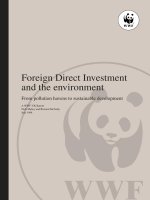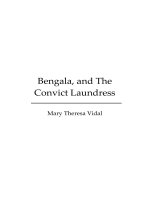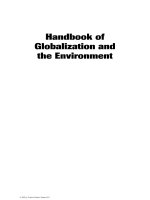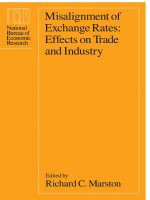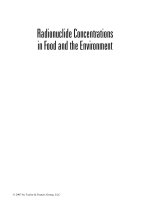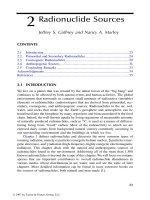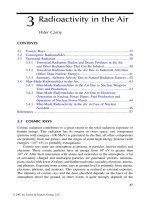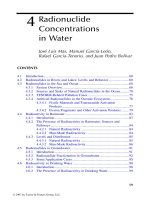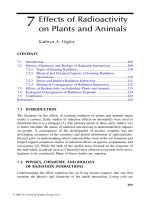Handbook on trade and the environment edited by kevin p gallagher
Bạn đang xem bản rút gọn của tài liệu. Xem và tải ngay bản đầy đủ của tài liệu tại đây (5.83 MB, 369 trang )
HANDBOOK ON TRADE AND THE ENVIRONMENT
Handbook on Trade and the
Environment
Edited by
Kevin P. Gallagher
Boston University, USA
Edward Elgar
Cheltenham, UK • Northampton, MA, USA
© Kevin P. Gallagher 2008
All rights reserved. No part of this publication may be reproduced, stored in a retrieval system or
transmitted in any form or by any means, electronic, mechanical or photocopying, recording, or
otherwise without the prior permission of the publisher.
Published by
Edward Elgar Publishing Limited
The Lypiatts
15 Lansdown Road
Cheltenham
Glos GL50 2JA
UK
Edward Elgar Publishing, Inc.
William Pratt House
9 Dewey Court
Northampton
Massachusetts 01060
USA
A catalogue record for this book
is available from the British Library
Library of Congress Cataloguing in Publication Data
Handbook on trade and the environment/edited by Kevin P. Gallagher.
p. cm. (Elgar original reference)
Includes bibliographical references and index.
1. Commerce—Environmental aspects. 2. International trade—
Environmental aspects. 3. Commercial policy—Environmental aspects.
4. Environmental policy—Economic aspects. 5. Environmental policy—
Political aspects. I. Gallagher, Kevin, 1968– .
HF1008.H375
2008
333.7—dc22
2008040341
ISBN 978 1 84720 454 7 (cased)
Printed and bound in Great Britain by MPG Books Ltd, Bodmin, Cornwall
Contents
List of figures and tables
List of contributors
List of abbreviations
vii
ix
xviii
Introduction: international trade and the environment
Kevin P. Gallagher
PART I
1
2
3
4
5
6
7
8
9
10
11
12
13
TRADE AND ENVIRONMENTAL QUALITY
Pre-empting NIS introductions: targeting policy
Christopher Costello, Chad Lawley and Carol McAusland
International trade and global shipping
James J. Corbett and James J. Winebrake
The environmental Kuznets curve
James Van Alstine and Eric Neumayer
The pollution haven hypothesis
Brian R. Copeland
Trade, natural resources and developing countries
Edward B. Barbier
Foreign direct investment and sustainable industrial development
Lyuba Zarsky
Globalization and the environment: convergence or divergence?
James K. Boyce
The relation between international trade and water resources management
A.Y. Hoekstra
The environmental costs of Mexico–USA maize trade under NAFTA
Timothy A. Wise
The impact of open trade and investment regimes on environmental
outcomes in East Asia’s capitalist developmental states
Michael T. Rock and David Angel
Foreign direct investment and clean technology leapfrogging in China
Kelly Sims Gallagher
PART II
1
19
33
49
60
71
83
97
116
126
136
147
TRADE AND ENVIRONMENTAL POLITICS
Global mechanisms for greening TNCs: inching towards corporate
accountability?
Jennifer Clapp
Civil society participation in trade policy-making in Latin America:
the case of the environmental movement
Peter Newell
v
159
171
vi
14
15
16
17
18
Contents
Trade conflict over genetically modified organisms
Thomas Bernauer and Philipp Aerni
The politics of trade and environment in the European Union
Henrik Selin and Stacy D. VanDeveer
Environmental politics and global shipping trade: club goods as a solution
to common-pool resource problems
Elizabeth R. DeSombre
Fair trade, gender and the environment in Africa
Laura T. Raynolds and Jennifer A. Keahey
The global waste trade and environmental justice struggles
David Naguib Pellow
PART III
19
20
21
22
23
24
25
26
27
194
204
213
225
TRADE AND ENVIRONMENTAL POLICY
An introduction to the trade and environment debate
Steve Charnovitz
The WTO, services and the environment
Robert K. Stumberg
Biodiversity, intellectual property rights regime, and indigenous
knowledge system at the WTO: revisiting the unresolved issues
Sachin Chaturvedi
Investor rights and sustainable development
Chris Tollefson and W.A.W. Neilson
Does environmental policy affect trade? The case of EU chemicals policy
Frank Ackerman
Environmental regulation, globalization and innovation
Nicholas A. Ashford
Trade and environment policy-making in the Arab region
Carol Chouchani Cherfane
Trade and environment institutions
J. Samuel Barkin
Redesigning the world’s trading system for environmentally sustainable
development
Alejandro Nadal
Index
183
237
246
267
276
287
296
308
318
327
337
Figures and tables
Figures
2I.1 The environmental Kuznets curve
22.1 Ocean shipping (a) as a substitute and (b) as a complement
to other freight modes
22.2 Comparison of freight-mode shares (tonne-km) for the USA and Europe
22.3 Summary of estimated ranges in global emissions from maritime
shipping
22.4 Global shipping network of routes and ports
22.5 Global indices for seaborne trade, ship energy/fuel demand and installed
power
23.1 Environmental degradation and per capita income
27.1 Environmental convergence: four scenarios
27.2 Environmental degradation, income inequality and per capita income
16.1 PSC records of detention ratios
20.1 LNG security near Boston
20.2 States with RPS, June 2007
20.3 Relevance test applied to licensing requirements for coastal development
of LNG port
24.1 The efficient frontier for current and future technology contrasting
sustaining and disrupting innovation
Tables
2I.1 Stolper–Samuelson and sustainable development
22.1 Overview of types of ocean shipping pollution
22.2 Profile of world commercial fleet, number of main engines, and main
engine power
22.3 International marine fuel sales by nation, 1990–99
23.1 Estimated turning points for various pollutants and studies
25.1 Low- and middle-income countries and patterns of resource use
15.1 EU membership growth
17.1 Fair trade certified sales in major markets
17.2 Growth of fair trade certified sales by commodity
17.3 Fair trade certified production by region, 2004
17.4 Certified fair trade producer organizations in Africa
20.1 Environmental sectors
21.1 Potential synergies between biotechnology development and
value-added bioprospecting
vii
6
34
35
39
40
42
51
98
108
211
247
256
260
300
4
36
37
38
52
78
195
214
215
216
217
251
271
Contributors
Frank Ackerman is an economist who has written extensively about the economics of
environmental policy in areas including international trade, climate change and chemicals
policy. His most recent books, published in 2008, are Poisoned for Pennies: The Economics
of Toxics and Precaution (Island Press) and Can We Afford the Future? Economics for a
Warming World (Zed Press). He has written numerous academic and popular articles, and
has directed policy reports for clients ranging from Greenpeace to the European
Parliament. At Tufts University’s Global Development and Environment Institute
(GDAE) since 1995, he now works jointly with the Stockholm Environment Institute–US
Center, also located at Tufts. He received a PhD from Harvard University, and has taught
economics at Tufts and at the University of Massachusetts.
Philipp Aerni graduated in Geography and Economics at the University of Zurich in 1996
and received his PhD from the Institute of Agricultural Economics at the Swiss Federal
Institute of Technology (ETH) in Zurich in 1999. From January 2000 to April 2002, he
continued his research as a postdoctoral research fellow in the Science, Technology and
Innovation Program at the Center for International Development at Harvard University,
Cambridge, MA, USA. Apart from his research at the World Trade Institute, he is currently heading two National Science Foundation Projects (NFP 59). Philipp Aerni is also
co-founder and member of the management steering team of the Geneva-based NGO
‘Africa Technology Development Forum’ (ATDF). The main objective of ATDF is to
promote science, technology and entrepreneurship in Africa.
James Van Alstine is a Fellow in Environmental Policy Studies and a PhD candidate in
the Department of Geography and Environment at the London School of Economics and
Political Science. His research focuses on the social and environmental risks of industrial
development, the governance of resource extraction in developing countries, and the
dynamics of institutional and organizational change. His dissertation explores the contestation of corporate environmentalism in the South African petrochemical industry.
David Angel holds the Laskoff Professorship in Economics, Technology and the
Environment at Clark University where he is also Professor of Geography, Provost and
Vice President for Academic Affairs. His current work focuses on global economic change
and the environment, with a particular focus on rapidly industrializing economies in Asia.
Recent books include: Asia’s Clean Revolution: Industry, Growth and the Environment
(with Michael T. Rock, 2000, Greenleaf Publishers), Effective Environmental Regulation:
Learning from Poland’s Experience (with Halina Brown and Patrick Derr, 2000, Praeger
Press) and Industrial Development in the Developing World (with Michael T. Rock, 2005,
Oxford University Press).
Nicholas A. Ashford is Professor of Technology and Policy at the Massachusetts Institute
of Technology, where he teaches courses in ‘Sustainability, Trade and Environment’. He is
the co-author of a new textbook on Environmental Law, Policy, and Economics: Reclaiming
the Environmental Agenda (MIT Press, 2008) and a forthcoming textbook/reader on
ix
x
Contributors
Technology, Globalization, and Sustainability. He has published several hundred articles in
peer-reviewed journals and law reviews. Dr Ashford was a public member and chairman
of the National Advisory Committee on Occupational Safety & Health, served on the EPA
Science Advisory Board, and was chairman of the Committee on Technology Innovation
& Economics of the EPA National Advisory Council for Environmental Policy and
Technology. Dr Ashford is a Fellow of the American Association for the Advancement of
Science and former chair of its Section on Societal Impacts of Science and Engineering.
He served as an advisor to the United Nations Environment Programme and is also legislation, regulation and policy editor of the Journal of Cleaner Production and serves on the
editorial board of the Journal of Environmental Technology and Management. He currently
serves as co-chair of the US–Greece Council for the Initiative on Technology Cooperation
with the Balkans.
Edward B. Barbier is the John S. Bugas Professor of Economics, Department of
Economics and Finance, University of Wyoming. He has over 25 years’ experience as an
environmental and resource economist, working on natural resource and development
issues as well as the interface between economics and ecology, and has published widely
in these fields.
J. Samuel Barkin is Associate Professor of Political Science at the University of Florida.
His research interests are international organization and international environmental politics. Within the latter category, he has published work on issues such as the relationship
between international trade and the environment, and international fisheries politics, in
journals such as Global Environmental Politics, Environment and Politics and Global
Governance.
Thomas Bernauer is Professor of Political Science (International Relations) in ETH
Zurich’s Department of Social Sciences and Humanities (D-GESS). He heads a group of
around ten persons that forms part of the Center for Comparative and International
Studies (CIS) and the Institute for Environmental Decisions (IED). Bernauer teaches primarily in D-GESS and the Department of Environmental Sciences (D-UWIS). Currently
he also serves as director of the CIS and is a member of the Swiss National Science
Foundation’s Research Council. In his research and teaching, Thomas Bernauer focuses
on international economic and environmental issues. His book publications include
Genes, Trade and Regulation (Princeton University Press, 2003), Staaten im Weltmarkt
(States in World Markets; Leske+Budrich, 2000), The Politics of Positive Incentives in
Arms Control (University of South Carolina Press, 1999), Handel und Umwelt (Trade and
the Environment; Westdeutscher Verlag, 1999) and The Chemistry of Regime Formation
(Dartmouth Publishers, 1993). He has published in journals such as British Journal of
Political Science, European Journal of International Relations, Water Resources Research,
International Organization, Journal of Public Policy, Zeitschrift für Internationale
Beziehungen, PVS, European Journal of Political Research, Business and Politics, World
Development, Journal of Environment and Development, Aquatic Sciences, Environmental
Politics, International Journal of BioTechnology, Swiss Political Science Review, Bulletin
of Peace Proposals and Security Dialogue.
James K. Boyce teaches economics at the University of Massachusetts, Amherst, where
he directs the program on development, peacebuilding and the environment at
Contributors
xi
the Political Economy Research Institute. His books include The Political Economy of the
Environment (Edward Elgar, 2002), Natural Assets: Democratizing Environmental
Ownership (Island Press, 2003) and Reclaiming Nature: Environmental Justice and
Ecological Restoration (Anthem Press, 2007). He is a member of the steering committees of the Forum on Social Wealth and E3: Economics for Equity and the Environment.
He received his BA from Yale University and his PhD from Oxford University.
Steve Charnovitz is Associate Professor of Law at George Washington University Law
School. He writes frequently in the field of international law. He is the author of Trade
Law and Global Governance (2002).
Sachin Chaturvedi is a Fellow at the Research and Information System for the Developing
Countries. His areas of specialization include trade and economic issues related to technology and innovation systems, and possible linkages with frontier technologies. He
has also served as a consultant to the UN Food and Agriculture Organization, the
World Bank, UNESCAP, UNESCO, OECD, the Commonwealth Secretariat, IUCN,
the Ministry of Environment and Forests and Department of Biotechnology and the
Government of India, among other organizations. He was Visiting Fellow at the
University of Amsterdam (1996), the Institute of Advanced Studies, Shimla (2003) and
the German Development Institute (2007). His experience and assignments include
working at the University of Amsterdam for a project supported by the Dutch Ministry
of External Affairs on International Development Cooperation and Biotechnology for
Developing Countries, and he has been a member of IGSAC Committee of Experts to
evolve a framework of cooperation for conservation of biodiversity in the SAARC
(South Asian Association for Regional Cooperation) region. He is on the editorial board
of Biotechnology Development Monitor, The Netherlands, and Asian Biotechnology
Development Review, New Delhi. He is author of two books and has published several
research articles in various prestigious journals.
Carol Chouchani Cherfane is the Acting Team Leader of the Technology and Enterprise
Development Team in the Sustainable Development and Productivity Division of the
United Nations Economic and Social Commission of Western Asia (ESCWA) in Beirut,
Lebanon. She also provides training and technical assistance in support of the Program
on Trade and Environment Capacity Building in the Arab Region on behalf of ESCWA
in cooperation with the League of Arab States and United Nations Environment
Program. The subject of her doctoral research at the Fletcher School of Law and
Diplomacy is trade and environment decision-making in the Arab region. The views
expressed in this book are those of the author and do not necessarily reflect the views of
the United Nations.
Jennifer Clapp is Professor of Environmental Studies and a CIGI Research Chair in
International Governance at the University of Waterloo. Her most recent book is Paths
to a Green World: The Political Economy of the Global Environment (with Peter
Dauvergne, MIT Press). She is the author of a number of research articles on the global
political economy of agriculture, food and the environment.
Brian R. Copeland is Professor and Head of the Department of Economics at the
University of British Columbia. His research has focused on developing analytical
xii
Contributors
techniques to study the interaction between international trade and the environment. He
has published in the leading economics journals, including the American Economic
Review, Quarterly Journal of Economics, Journal of International Economics and the
Journal of Economic Literature. He and his colleague Scott Taylor are the authors of the
book, Trade and the Environment: Theory and Evidence (Princeton University Press,
2004). He was previously co-editor of the Journal of Environmental Economics and
Management and is currently an associate editor of the Journal of International
Economics. Professor Copeland is the recipient of several awards, including the Purvis
Prize and a UBC-Killam research prize.
James J. Corbett conducts technology-policy research related to transportation, including groundbreaking research on air emissions from maritime transport, energy and environmental impacts of freight transportation, and assessment of technological and policy
control strategies for goods movement. Dr Corbett is Associate Professor in the Marine
Policy Program of the College of Marine and Earth Studies, and Associate Professor of
Civil and Environmental Engineering in the College of Engineering at the University of
Delaware. Dr Corbett’s experience includes work as a licensed officer in the US Merchant
Marine, a Naval Reserve Engineering Duty Officer, and consulting for industry and government in industrial operations, energy and environmental performance. He has more
than 30 peer-reviewed publications related to shipping and multimodal transportation; he
co-authored the 2000 IMO Study on Greenhouse Gases from Ships, and wrote the ‘Marine
Transportation and Energy Use’ chapter in the 2004 Encyclopedia of Energy.
Christopher Costello is Associate Professor of Environmental and Resource Economics
at the Donald Bren School of Environmental Science & Management, UC Santa
Barbara. His research is primarily in the area of environmental regulation and natural
resource management under uncertainty, with a particular emphasis on information, its
value, and its effect on management decisions. He is also interested in the process and
design of adaptive management programs in which learning (to resolve uncertainty or
asymmetric information) is actively pursued. Topical interests include biological diversity,
introduced species, regulation of polluting industries and marine policy. Costello frequently collaborates with research outside of economics such as statistics, ecology, biogeography and mathematics.
Elizabeth R. DeSombre is Frost Professor of Environmental Studies and Professor of
Political Science at Wellesley College. Her research is on global environmental politics, particularly relating to issues of the global commons. Her recent books include Flagging
Standards: Globalization and Environmental, Safety, and Labor Standards at Sea (MIT Press,
2006) and Global Environmental Institutions (Routledge, 2006). Her first book, Domestic
Sources of International Environmental Policy: Industry, Environmentalists, and U.S. Power
(MIT Press, 2000) won the 2001 Chadwick F. Alger Prize for the best book published in 2000
in the area of international organization, and the 2001 Lynton Caldwell Award for the best
book published on environmental policy. A second edition of her textbook, The Global
Environment and World Politics (London: Continuum, 2002) was published in 2007.
Kelly Sims Gallagher, Adjunct Lecturer in Public Policy, is director of the Energy
Technology Innovation Policy (ETIP) research group at the Harvard Kennedy School’s
Belfer Center for Science and International Affairs. Her work is focused on studying,
Contributors
xiii
informing and shaping US and Chinese energy and climate-change policy. USA–China
energy cooperation and energy-technology innovation, including technology transfer, are
important themes in her work. She has specialized particularly on energy policy related
to transportation and coal in both countries. She is currently serving on the Task Force
on Innovation for the China Council for International Cooperation on Environment and
Development, and as Counselor-at-Large for the Asia Society–Council on Foreign
Relations–Brookings Institution Initiative for USA–China Cooperation on Energy and
Climate. She previously worked for Fluor Daniel Environmental Services, the Office of
Vice President Al Gore, and Ozone Action. She speaks Spanish and basic Mandarin
Chinese, and is the author of China Shifts Gears: Automakers, Oil, Pollution, and
Development (MIT Press, 2006).
Kevin P. Gallagher is an assistant professor of international relations at Boston
University. He is the author of The Enclave Economy: Foreign Investment and Sustainable
Development in Mexico’s Silicon Valley (with Lyuba Zarsky) (MIT Press, 2007), and Free
Trade and the Environment: Mexico, NAFTA, and Beyond (Stanford Law and Politics,
2004). He has been the editor or co-editor of a number of books, including Putting
Development First: The importance of Policy Space in the WTO and IFIs (Zed Books,
2005), International Trade and Sustainable Development (Earthscan, 2002), and others.
He is a research fellow at the Frederick S. Pardee Center for the Study of the LongerRange Future, where he directs the Global Economic Governance Initiative. Professor
Gallagher is also a research associate at the Global Development and Environment
Institute of the Fletcher School of Law and Diplomacy at Tufts University, the Political
Economy Research Institute at the University of Massachusetts, Amherst, an adjunct
fellow at the Research and Information System for Developing Countries in Delhi, India,
and a member of the US–Mexico Futures Forum.
A.Y. Hoekstra is Professor in Multidisciplinary Water Management at the University of
Twente, The Netherlands. His research focuses on integrated water resources planning,
river basin management and global water issues. His books include Perspectives on Water
(International Books, 1998) and Globalization of Water (with A.K. Chapagain)
(Blackwell, 2008).
Jennifer A. Keahey is a PhD student in sociology and Research Assistant for the Center
for Fair & Alternative Trade Studies at Colorado State University. Her primary research
interests focus on the gender and empowerment dimensions of fair trade in Africa. She
has worked in Ghana with a small-scale farmer organization seeking to strengthen indigenous low-external-input technologies and rural women’s groups engaged in income generation projects. Her past research focuses also on the organic movement in Latvia.
Chad Lawley is a PhD candidate in the Department of Agricultural and Resource
Economics at the University of Maryland.
Carol McAusland is Assistant Professor at the University of Maryland, Department of
Agricultural and Resource Economics. Her research focuses on the interaction between
globalization, politics, and the provision of environmental and other public goods.
Alejandro Nadal is a full professor at the Center for Economic Studies at El Colegio de
México. He has carried out research on macroeconomics, general equilibrium theory,
xiv
Contributors
technical change and sustainable resource management. Recent publications include (with
Frank Ackerman) The Flawed Foundations of General Equilibrium: Critical Essays in
Economic Theory (Routledge, 2005), ‘Stability and capital flows in the open economy
model’ (in Experiencias de crisis y estrategia de desarrollo: autonomía económica y globalización, El Colegio de México, 2006) and ‘Coasean fictions: law and economics revisited’
(Seattle Journal of Social Justice, forthcoming). He is chair of the Theme on the
Environment, Macroeconomics, Trade and Investment (TEMTI) of the World
Conservation Union (IUCN). He writes a weekly column on economics and sustainability in La Jornada, one of Mexico’s leading national newspapers.
W.A.W. Neilson is Professor Emeritus of Law, University of Victoria, Canada. His recent
work and publications have been in comparative legal regimes, regional trade agreements,
parliamentary law-making and the intersection between intellectual property and competition law fields, particularly in transitional economies in Asia.
Eric Neumayer is Professor of Environment and Development in the Department of
Geography and Environment at the London School of Economics and Political Science
(LSE). He has broad research interests all relating to evidence-based public policy
making. He has published widely in a range of journals across different social science disciplines. His recent books include Handbook of Sustainable Development (Edward Elgar,
2007, co-edited with Dr Giles Atkinson and Dr Simon Dietz), Weak versus Strong
Sustainability: Exploring the Limits of Two Opposing Paradigms (Edward Elgar, revised
edition, 2003), The Pattern of Aid Giving: The Impact of Good Governance on Development
Assistance (Routledge, 2003) and Greening Trade and Investment: Environmental
Protection without Protectionism (Earthscan, 2001).
Peter Newell is Professor of Development Studies at the University of East Anglia and
James Martin Fellow at the Oxford University Centre for the Environment. He has
researched and published widely on the relationship between the global political economy
and environmental governance. In recent years he has been involved in research on civil
society and trade politics in Latin America in general, and environmental politics in
Argentina in particular.
David Naguib Pellow is Professor of Ethnic Studies at the University of California, San
Diego, where he teaches courses on social movements, environmental justice, globalization, immigration, and race and ethnicity. He has published a number of works on environmental justice issues in communities of color in the USA and globally. His books
include: The Treadmill of Production: Injustice and Unsustainability in the Global Economy
(with Kenneth Gould and Allan Schnaiberg, Paradigm Press, 2008); Resisting Global
Toxics: Transnational Movements for Environmental Justice (MIT Press, 2007); The Silicon
Valley of Dreams: Environmental Injustice, Immigrant Workers, and the High-tech Global
Economy (with Lisa Sun-Hee Park, New York University Press, 2002); Garbage Wars: The
Struggle for Environmental Justice in Chicago (MIT Press, 2002); Urban Recycling and
the Search for Sustainable Community Development (with Adam Weinberg and Allan
Schnaiberg, Princeton University Press, 2000); Power, Justice, and the Environment: A
Critical Appraisal of the Environmental Justice Movement (editor, with Robert J. Brulle,
MIT Press, 2005); and Challenging the Chip: Labor Rights and Environmental Justice in
the Global Electronics Industry (co-editor, with Ted Smith, David Sonnenfeld and Leslie
Contributors
xv
Byster, Temple University Press, 2006). Pellow is the director of the California Cultures in
Comparative Perspective – an international research initiative based at University of
California, San Diego. He has served on the boards of directors of several communitybased, national and international organizations that are dedicated to improving
the living and working environments for people of color, immigrants and working-class
communities.
Laura T. Raynolds is co-director of the Center for Fair & Alternative Trade Studies and
Professor of Sociology, Colorado State University. She has done extensive research on
fair/alternative trade, global agro-food networks and gendered labor forces. Recent publications in these areas include: Fair Trade: The Challenges of Transforming Globalization
(with D. Murray and J. Wilkinson, Routledge, 2007), as well as over two dozen book chapters and articles in journals such as World Development, Sociologia Ruralis, Gender &
Society, and Agriculture and Human Values.
Michael T. Rock is the Harvey Wexler Professor of Economics at Bryn Mawr College,
USA. His published research focuses on the environment and development, and the role
of industrial policy in the second-tier newly industrializing economies of Southeast Asia.
His most recent books included Industrial Transformation in the Developing World (with
David Angel, Oxford University Press, 2005) and Pollution Control in East Asia (Institute
for International Economics, 2002). Rock is currently working on a book on democracy
and development in Southeast Asia.
Henrik Selin is Assistant Professor in the Department of International Relations at
Boston University. Educated at universities in Sweden and England, he was a Wallenberg
Research Fellow in Environment and Sustainability at the Massachusetts Institute of
Technology, USA before taking up his current faculty position. His research and teaching focuses on international and European politics, policy-making and implementation on environment and sustainability issues. He has published numerous book
chapters and journal articles on these issues in, among others, Journal of European Public
Policy, Review of European Community & International Environmental Law, Global
Environmental Politics, International Environmental Agreements: Politics, Economics and
Law, Global Governance and Ambio. His current research focuses on the history of sustainable development, and European, North American and global policy developments
on hazardous substances, hazardous wastes and climate change.
Robert K. Stumberg is Professor of Law at Georgetown University and director of
Georgetown’s Harrison Institute for Public Law. His experience in law and public policy
includes serving as counsel to the Forum on Democracy & Trade, policy director for the
Center for Policy Alternatives, and legislative counsel to local governments in the
Washington, DC area. He has published analysis of trade policy and climate change,
utility regulation, investor rights, prescription drug programs, and the authority of subnational governments to promote human rights.
Chris Tollefson is Professor of Law and Executive Director of the Environmental Law
Centre at the Faculty of Law, University of Victoria, Canada. His current research interests include access to justice and environmental governance, regional trade agreements,
and indigenous rights and resource management. His most recent publication is Setting
xvi
Contributors
the Standard: Certification, Governance and the Forest Stewardship Council (2008, UBC
Press).
Stacy D. VanDeveer is Associate Professor of Political Science at the University of New
Hampshire. His research interests include international environmental policy-making
and its domestic impacts, the connections between environmental and security issues,
and the role of expertise in policy-making. His current research projects include assessment of climate change politics and policy-making across North America, transatlantic
environmental and trade relations, and the structure and effects of fair trade campaigns.
He has received fellowships from the Belfer Center for Science and International Affairs
at Harvard University’s John F. Kennedy School of Government and the Watson
Institute for International Studies at Brown University. His work been funded by the
US National Science Foundation, the European Union and the Swedish Foundation for
Strategic Environmental Research (MISTRA), among others. In addition to authoring
and co-authoring numerous articles, book chapters, working papers and reports, he coedited EU Enlargement and the Environment: Institutional Change and Environmental
Policy in Central and Eastern Europe (Routledge, 2005) and Saving the Seas: Values,
Science and International Governance (Maryland Sea Grant Press, College Park, MD,
1997).
James J. Winebrake, PhD, is a teacher and researcher working to solve problems in the
energy and environmental fields. His research applies analytical tools to study such topics
as alternative transportation technologies, greenhouse gas reduction policies, health
impacts of transportation pollution, and transportation systems dynamics. His most
recent work involves the application of life-cycle analysis tools, technology optimization
modeling and uncertainty analysis to better understand how to mitigate the environmental impacts of personal and freight transportation. Dr Winebrake is currently chair of the
Department of Science, Technology & Society/Public Policy at Rochester Institute of
Technology (RIT). He also serves as co-director of the RIT Laboratory for Environmental
Computing and Decision Making, and is a partner in the consulting firm Energy and
Environmental Research Associates, LLC in Pittsford, NY. Before his position at RIT, Dr
Winebrake taught for seven years at James Madison University and worked for the US
Department of Energy, Office of Energy Efficiency and Renewable Energy. He lives with
his wife, Susan, and four children in upstate New York.
Timothy A. Wise is deputy director and researcher at the Global Development and
Environment Institute at Tufts University. He is the former executive director of
Grassroots International, a Boston-based international aid organization, and co-author
of Confronting Globalization: Economic Integration and Popular Resistance in Mexico
(Kumarian Press, 2004). His current research focuses on globalization’s impact on small
farmers and the environment.
Lyuba Zarsky is Associate Professor in the International Environmental Policy Program
of the Monterey Institute of International Studies in Monterey, California. Her research
focuses on policy-relevant studies of globalization, sustainable development and market
governance. In the 1990s, she co-founded and co-directed the Nautilus Institute for
Security and Sustainability, based in Berkeley. She has also worked for the government of
Australia in designing a national sustainable development strategy, and has consulted with
Contributors
xvii
a wide range of international organizations, including the OECD, the Asian Development
Bank and the UN Development Program. Her recent books include Enclave Economy,
Foreign Investment and Sustainable Development in Mexico’s Silicon Valley (with Kevin
Gallagher, MIT Press, 2007), International Investment for Sustainable Development:
Balancing Rights and Rewards (Earthscan, 2005) and Human Rights and the Environment:
Conflicts and Norms in a Globalizing World (Earthscan, 2003). She is a Senior Research
Fellow with the Global Development and Environment Institute at Tufts University
in Boston, and an International Research Fellow at the International Institute for
Environment and Development in London.
Abbreviations
ABS
AFRM
APEC
APHIS
ASEAN
ATDF
AUSTFA
BAN
BAU
BEA
BECC
BITs
BSE
CAGR
CAMRE
CBD
CCAMLR
CERES
CFCs
CIS
CITES
CoP
CSR
CTBC
CTE
DDA
EEZ
EFSA
EHS
EIA
EKC
ENGO
EPA
EPPs
ESCWA
ESG
ESP
ETH
ETIP
access and benefit-sharing
alternative fuels and raw materials
Asia–Pacific Economic Cooperation
Animal and Public Health Information System
Association of Southeast Asian Nations
Africa Technology Development Forum
Australia–US Free Trade Agreement
Basel Action Network
business as usual
British Environment Agency
Border Environmental Cooperation Commission (USA–Mexico)
bilateral investment treaties
bovine spongiform encephalopathy
compound annual growth rate
Council of Arab Ministers Responsible for the Environment
Convention on Biological Diversity
Convention for the Conservation of Antarctic Marine Living
Resources
Coalition for Environmentally Responsible Economies
chlorofluorocarbons
Center for Comparative and International Studies
Convention on International Trade in Endangered Species of Wild
Fauna and Flora
Conference of Parties
corporate social responsibility
Computer TakeBack Campaign
Committee on Trade and the Environment (WTO)
Doha Development Agenda
Exclusive Economic Zone (EU)
European Food Safety Authority
environmental health and safety
Energy Information Administration (USA)
environmental Kuznets curve
environmental non-government organization
Environmental Protection Agency (USA)
environmentally preferable products
UN Economic and Social Commission for Western Asia
environmental, social and governance
electro-static precipitator
Swiss Federal Institute of Technology (Zurich)
Energy Technology Innovation Policy (US research group)
xviii
Abbreviations
FAO
FDA
FDI
FLO-I
FOC
FTA
FTAA
GAFTA
GATS
GATT
GC
GDAE
GDP
GMO
GRI
GRRN
HACCP
HFO
HS
IAS
ICA
ICC
ICRT
ICSID
IEA
IED
IGC
IIA
IISD
IKS
ILO
IMO
IMS
IO
IPPC
IPR
ITF
ITPGRFA
IUCN
JCEDAR
JPAC
LAS
LDC
Food and Agriculture Organization
Food and Drug Administration (USA)
foreign direct investment
Fairtrade Labelling Organizations International
flag of convenience
free trade agreement
Free Trade Area of the Americas
Greater Arab Free Trade Area
General Agreement on Trade in Services
General Agreement on Tariffs and Trade
Global Compact (UN)
Global Development and Environment Institute (USA)
gross domestic product
genetically modified organism
Global Reporting Initiative
GrassRoots Recycling Network
Hazard Analysis and Critical Control Point
heavy fuel oil
Harmonized System (EU)
invasive alien species
international commodity agreement
International Chamber of Commerce
International Campaign for Responsible Technology
International Centre for the Settlement of Investment Disputes
International Energy Agency
Institute for Environmental Decisions
Inter-Governmental Committee
international investor agreement
International Institute for Sustainable Development
indigenous knowledge system
International Labor Organization
International Maritime Organization
international minimum standard
international organization
International Plant Protection Convention
intellectual property rights
International Transport Workers’ Federation
International Treaty on Plant Genetic Resources for
Food and Agriculture
World conservation Union (formerly International Union for
Conservation of Nature and Natural Resources)
Joint Commission for Environment and Development in
the Arab Region
Joint Public Advisory Committee (NAFTA)
League of Arab States
less developed country
xix
xx
Abbreviations
LMICs
LNG
LSE
MA
M&A
MEA
MDO
MFN
MGO
MIR
MISTRA
MMPA
MNC
MOU
MW
NAAEC
NACEC
NAFTA
NGO
NIS
NT
NTB
OECD
PCB
PCT
PFC
PIC
PLT
PP
PPMs
PPP
PRI
PSC
R&D
RCRA
REACH
RIT
RMALC
RoHS
SAARC
S&DT
SARS
SCC
SCM
SPLT
SPS
low- and middle-income countries
liquefied natural gas
London School of Economics and Political Science
market access
mergers and acquisitions
multilateral environmental agreement
marine distillate oil
most favored nation
marine gas oil
marginal invasion risk
Swedish Foundation for Strategic Environmental Research
Marine Mammal Protection Act (USA)
multinational corporation
Memorandum of Understanding
megawatt
North American Agreement on Environmental Cooperation
North American Commission for Environmental Cooperation
North American Free Trade Agreement
non-governmental organization
non-indigenous species
national treatment
non-tariff barrier
Organisation for European Co-operation and Development
polychlorinated biphenyl
Patent Cooperation Treaty
perfluorocarbon
prior informed consent
Patent Law Treaty
precautionary principle
processes and production methods
purchasing power parity
Principles for Responsible Investment
port state control
research and development
Resource Conservation and Recovery Act (USA)
Registration, Evaluation, and Authorization of Chemicals
Rochester Institute of Technology (USA)
Mexican Action Network on Free Trade
Restriction on Hazardous Substances (EU)
South Asian Association for Regional Cooperation
special and differential treatment
severe acute respiratory syndrome
Stockholm Chamber of Commerce
Subsidies and Countervailing Measures (Agreement)
Substantive Patent Law Treaty
Sanitary and Phytosanitary Measures
Abbreviations
SVTC
TBT
TNC
TREM
TRIPs
TRQ
UNCED
UNCITRAL
UNCLOS
UNCTAD
UNDP
UNEP/ROWA
UNESCAP
UNESCO
URAA
USDA
USPTO
WEEE
WHO
WIPO
WSSD
WTO
Silicon Valley Toxics Coalition
Technical Barriers to Trade
transnational corporation
trade-related environmental measure
Trade-Related Aspects of Intellectual Property (Rights)
tariff rate quota
UN Conference on Trade and Development
UN Commission on International Trade Law
UN Convention on the Law of the Sea
UN Conference on Trade and Development
UN Development Program
UN Environment Program/Regional Office for West Asia
UN Economic and Social Commission for Asia and the Pacific
UN Educational, Scientific and Cultural Organization
Uruguay Round’s Agreement on Agriculture
US Department of Agriculture
US Patent and Trademark Office
Waste from Electrical and Electronic Equipment (EU Directive)
World Health Organization
World Intellectual Property Organization
World Summit on Sustainable Development
World Trade Organization
xxi
Introduction: international trade and the environment
Kevin P. Gallagher
Over the course of almost 20 years a burgeoning field of interdisciplinary research and
policy work has emerged surrounding the issues of international trade and the environment. The purpose of this book is to provide a comprehensive but not exhaustive study
of the thinking and policy around these issues. The contributors comprise close to 30 of
the world’s academic experts in the field, each of whom addresses the topics in his or her
sub-field. The volume will serve as a guide for both undergraduate and graduate students,
as well as for scholars wishing to start research in this field and to policy-makers wanting
a quick and comprehensive reference to research on trade and environment.
The world economy is witnessing a new wave of economic globalization, defined qualitatively as the integration of the world’s economies through an increasing array of multilateral, regional, and bilateral trade and investment agreements, as well as numerous
examples of governments that are unilaterally reducing the role of the state in economic
affairs. This in part has led to large increases in the volumes of international trade and
investment in the world economy. According to the World Bank, trade (exports plus
imports) as a percentage of world gross domestic product (GDP) was 24 percent in 1960,
38 percent in 1985 and 52 percent in 2005. In other words, over half of all economic activity in the world economy, which is close to US$50 trillion in size, is traded.
The environment has also experienced profound change during this period. According
to the recent Millennium Ecosystem Report conducted by 1300 experts from 95 countries,
‘60 percent of the ecosystem services that support life on Earth – such as fresh water,
capture fisheries, air and water regulation, and the regulation of regional climate, natural
hazards and pests – are being degraded or used unsustainably’ (UNDP, 2005). Such degradation is proving to be costly in economic terms. The World Bank and other international
agencies estimate that the economic costs of environmental degradation range from 6 to
10 percent of GDP on an annual basis.
How closely are these trends related? In other words, to what extent is the integration
of the world’s economies and the subsequent rise in world trade and investment affecting
the environment and its politics and policies? Early political debates in the late 1980s and
1990s were rife with contention over this issue. In what are now seen as rather simplistic
depictions of a very complex set of interactions, many argued that increased trade would
automatically improve the environment, while others said that trade automatically makes
the environment worse off. In the politics that ensued, for example in the negotiations surrounding the North American Free Trade Agreement (NAFTA), environment became the
‘make-or-break issue’ that led to the passage of the agreement.
The literature on trade and environment, mirrored in part by policy discussions on the
subject, can be divided into three sub-categories:
1.
Trade and environmental quality: this body of work examines the extent to which trade
and investment flows, and the policies that lead to increases in such flows, affect
1
2
2.
3.
Handbook on trade and the environment
environmental quality both positively and negatively. This literature consists of work
largely (but not exclusively) conducted by economists and natural scientists.
Trade and environmental politics: here scholars examine the political economy of environmental aspects of trade policy and conversely the trade aspects of environmental
policy. This work is largely conducted by political scientists.
Trade and environmental policy: this sub-field examines the extent to which new trade
rules affect the ability of nations and the global governance institutions outside the
trade regime to deploy effective environmental policy. There is also a literature on the
extent to which new environmental policies will affect the ability of firms to compete
internationally. This literature is often conducted by legal scholars, economists and
political scientists.
After almost 20 years of research that includes countless volumes, special journal
issues, articles, testimony and so forth, a number of the more contentious issues that arose
at the beginning of debates over trade and environment have reached close to consensus.
However, some are as controversial as ever. This brief introduction provides a context for
these three sub-fields and casts the chapters included in the book in this light.
Trade and environmental quality
Political and policy debates over trade and environment stem from conceptions regarding
the impact that trade will have on environmental quality. Since the early 1990s some have
contended that trade liberalization would lead to economic growth and that once nations
reached a certain level of income they would begin to reduce their negative impacts on the
environment. Others countered that trade liberalization would lead to a mass migration
of pollution-intensive firms to nations with weaker environmental laws. This would lead
to increases in pollution in the developing world and put downward pressure on environmental regulations in nations with stringent norms. Such debates jump-started what has
become a substantial literature on these questions. Ironically, there is now an emerging
consensus in academic thinking regarding these questions, yet the policy community is
often still mired in older debates.
The theory of international trade
In theory international trade and the environment can be mutually compatible, and
perhaps even reinforcing. According to independent theories of international trade on the
one hand, and environmental economics on the other, trade liberalization can bring economic benefits that can be distributed so as to reduce poverty and protect the environment.
The economist David Ricardo showed that because countries face different costs to
produce the same product, if each country produces and then exports the goods for which
it has comparatively lower costs, then all parties benefit. The effects of comparative
advantage (as Ricardo’s notion became called) on factors of production were developed
in the ‘Heckscher–Ohlin’ model. This model assumes that in all countries there is perfect
competition, technology is constant and readily available, there is the same mix of goods
and services, and that factors of production (such as capital and labor) can move freely
between industries.
Within this rubric, the Stolper–Samuelson theorem adds that international trade
can increase the price of products (and therefore the welfare) in which a country has a
